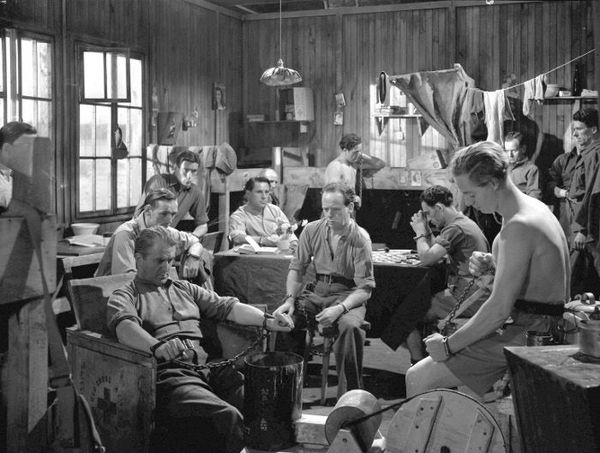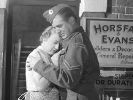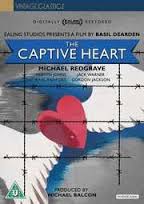Eye For Film >> Movies >> The Captive Heart (1946) Film Review
The Captive Heart
Reviewed by: Amber Wilkinson

We can only imagine what it must have been like to watch The Captive Heart on its original release in March 1946, less than a year after Britain had celebrated VE day. Then, as they wrote about the German Prisoner of War camps in Second World War, Angus MacPhail and Guy Morgan (from an original story by Patrick Kirwan) were telling a story as fresh and sharp as a paper cut to audiences who had experienced the real-life version all too recently, and long before the PoW dramas that now immediately spring to mind, such as The Colditz Story or The Great Escape. When the opening credits declare the film "dedicated to prisoners of war", many in the audience might have made a nod of acknowledgement.
Given the immediacy, it is perhaps no wonder that the story is leavened with some melodrama and romance, yet watching it now, Basil Dearden's film still has a surprisingly naturalistic aspect. The full horrors of prison camps may be glossed over somewhat, but there is strong depiction of the various sorts of losses experienced on the frontline and the homefront during war, driven by engaging characters and character-fuelled storytelling. There's even room for a spot of good old British comedy cynicism, such as when, on a flashback to the eve of dispatch into action, two old friends and working class business partners Corporal Ted Horsfall (Jack Warner) and Private Don Evans (Mervyn Jons) chat about heading off. "It's just a habit," says one. "We've got into fighting the same war every 20 years."

Most of our heroes have already been captured by the start of the film, and we join them on the long march to camp and see various men, including Horsfall, thinking about the time before the war. Also present is the upper-class Major Dalrymple (Basil Radford) lieutenant Stephen Harley (Derek Bond) and a young soldier David Lennox (Gordon Jackson), who has been blinded in battle.
All of these men have wives or girlfriends back in Blighty and though they have less screentime, there is weight to their wait. Ted and Don's wives Flo (Gladys Henson, who would play opposite Warner again in The Blue Lamp) and Di (Rachel Thomas) face up to the war with fortitude, although an unexpected shot of grief is on the horizon. Meanwhile, Elspeth McDougall (Margot Fitzsimmons) joins the war effort while she waits for David, while spite leads to trouble for Harley's girlfriend Caroline on the home front. These women may not be central to the action but they are also fighters in their own way, doing their bit for the war effort.
As we start to learn their stories - and the machinations of the camp - we are introduced to a final male, played by Michael Redgrave, who claims to be British officer Captain Geoffrey Mitchell. We are well aware, however, that he stole the captain's papers from his body and it is only a matter of time before his fellow prisoners learn the truth - that he is an escaped Czech prisoner, Karel Hasek, being hunted by the Nazis. In a bid to shore up his new persona with the camp hierarchy, Hasek is forced to write to the dead officer's wife Celia (played by Redgrave's wife Rachel Kempson in a forcefully good early role), little realising that he is rekindling a love affair that she had written off. The Captive Heart takes its time, giving a sense of the boredom experienced by the men in the long years between capture and freedom, along with the sacrifices they continue to make. This is a film about pulling together - even at a distance - fully celebrating the community spirit of the blitz.
It's true that not everything quite hits the spot, with the weakest point a melodramatic subplot involving the the permanently breathless Caroline and eternally sulky Stephen who seem prepared to "Oh, Stephen" and "Oh, Caroline" one another (and us) to death. The melodramatic notes work much more harmoniously between Hasek and Celia, building to a moving and well-earned climax thanks to careful writing and beautifully measured performances from the man and wife team. Throughout, Dearden's scene composition is spot on, deftly handling multiple characters on screen at once and letting each come to the fore in a way that feels natural rather than stilted. The film may not have the extreme immediacy that it had on first release, but its emotional heart is still beats strong despite the passing of the years.
Reviewed on: 04 Jan 2016

















